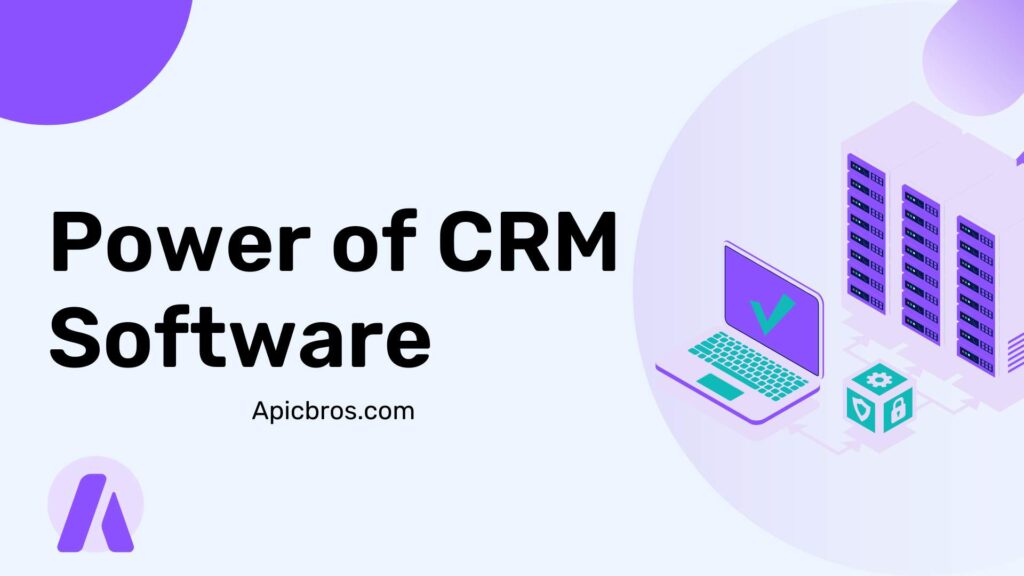Table of Contents

Unlocking-the-Power-of-CRM-Software: Transforming Customer Relationships in the Digital Age
Introduction,
Welcome to the comprehensive guide of Unlocking-the-Power-of-CRM-Software.
In today’s fast-paced and highly competitive business landscape, Customer Relationship Management (CRM) software has emerged as a critical tool for companies seeking to enhance their customer interactions, streamline operations, and drive growth. As businesses navigate the complexities of customer relationships in the digital age, CRM software offers a structured and strategic approach to managing these interactions effectively. This comprehensive article delves into the power of CRM software, exploring its features, benefits, and future trends that make it an indispensable asset for businesses in 2024 and beyond. Learn More
Understanding CRM Software in 2024
CRM software is a technology solution designed to help businesses manage their relationships with customers and potential clients. By 2024, CRM systems have evolved significantly, incorporating advanced technologies like artificial intelligence (AI) and machine learning. These systems not only store customer information but also analyze it to provide actionable insights. This evolution allows businesses to understand customer behavior better, anticipate needs, and tailor their services accordingly. With a focus on integration and user experience, modern CRM solutions are more intuitive and accessible than ever, making them suitable for organizations of all sizes.
Key Features and Functionalities of CRM Software
Modern CRM software is packed with features that enhance its functionality and usability. Here are some of the key features that businesses can expect in a robust CRM system:
- Centralized Customer Data: One of the primary functions of CRM software is to centralize all customer information in one platform. This includes contact details, purchase history, communication logs, preferences, and more, making it easy for teams to access relevant information quickly and efficiently.
- Automated Tasks: CRM systems help automate routine tasks such as sending follow-up emails, scheduling appointments, and generating reports. This automation frees up valuable time for employees, allowing them to focus on more strategic activities and provide better customer service.
- Analytics and Reporting: Advanced analytics tools within CRM software provide businesses with deep insights into customer behavior, sales trends, and performance metrics. Customizable reports help teams track key performance indicators (KPIs) and make informed, data-driven decisions that drive growth.
- Lead Management: Effective lead management is crucial for sales success. CRM systems enable businesses to track leads through the sales funnel, from initial contact to conversion, ensuring that no potential customer is overlooked and that every opportunity is maximized.
- Integration with Other Tools: Many CRM solutions offer seamless integration capabilities with other business tools, such as email marketing platforms, social media, accounting software, and more. This integration enhances the overall functionality of the CRM and streamlines workflows, improving efficiency and productivity.
Transforming Customer Relationships
The true power of CRM software lies in its ability to transform how businesses interact with their customers. By centralizing customer data and providing deep insights into customer behavior, CRM systems empower companies to make data-driven decisions that improve customer service, enhance personalization, and drive sales. This leads to improved customer satisfaction, as businesses can respond to inquiries and concerns more effectively. Additionally, personalized marketing efforts become possible, as businesses can tailor their messages based on individual customer preferences, history, and behavior.
Why CRM Software is Powerful
CRM software is powerful because it fosters stronger, more meaningful relationships between businesses and their customers. By tracking interactions and gathering insights, companies can create personalized experiences that resonate with their audience. This personalized attention not only enhances customer satisfaction but also builds loyalty, encouraging repeat business and referrals. Furthermore, CRM systems enable businesses to identify trends and opportunities, allowing them to adapt their strategies proactively and stay ahead of the competition.
What Sets CRM Software Apart
What sets CRM software apart from other business tools is its laser-sharp focus on customer relationships. Unlike traditional management systems, CRM software is designed specifically to enhance interactions with customers and drive growth through better engagement. Its adaptability is another unique feature; businesses can customize CRM solutions to meet their specific needs, whether they are small startups or large corporations. Additionally, the integration of AI and machine learning technologies in many CRM systems adds a layer of sophistication, enabling predictive analytics that can forecast customer behavior and improve engagement strategies.
The Future of CRM Software: Continuous Innovation and Advancement
The future of CRM software is bright, with continuous advancements in technology driving innovation and transformation. As businesses increasingly rely on data to inform their decisions, CRM systems are evolving to provide deeper insights and more robust functionalities. Enhanced mobile access, improved user interfaces, and AI-driven features are becoming standard. These advancements not only improve the user experience but also empower businesses to engage with customers more effectively, regardless of their location or device.
The Impact of CRM Software: Statistics and Success Stories
Statistics highlight the significant impact of CRM software on business performance. According to recent studies, companies that implement CRM systems can increase their sales by up to 29% and improve customer retention rates by 27%. Additionally, businesses that use CRM software report a 44% increase in sales productivity. These numbers underscore the value of CRM systems in driving growth, enhancing customer relationships, and delivering a strong return on investment (ROI).
Factors to Consider When Selecting CRM Software
Choosing the right CRM software is crucial for maximizing its benefits and ensuring a successful implementation. Here are some key factors to consider when selecting a CRM system:
- Ease of Use: A user-friendly interface is essential for ensuring team adoption. If the software is complicated or difficult to navigate, employees may resist using it, negating its benefits.
- Scalability: As your business grows, your CRM should be able to grow with it. Look for systems that offer scalability and can accommodate increasing data and user needs.
- Integration: The ability to integrate with existing tools and platforms is vital. A CRM that works seamlessly with your current systems will enhance productivity, reduce friction, and provide a more holistic view of customer interactions.
- Cost: Evaluate the pricing structure of the CRM, considering not only the initial costs but also ongoing expenses such as subscription fees and maintenance costs. Look for a solution that offers value and aligns with your budget.
Industries Benefiting Most from CRM Software
While CRM software can benefit any business, certain industries see particularly significant advantages due to the nature of their customer relationships and the unique challenges they face. For example:
- Retail: Retailers use CRM to manage customer preferences, track purchase history, and personalize marketing efforts, leading to increased sales and customer loyalty.
- Real Estate: Real estate professionals rely on CRM systems to manage leads, schedule property viewings, and maintain communication with clients throughout the buying process, ensuring a smooth and memorable experience.
- Healthcare: Healthcare providers use CRM software to manage patient relationships, appointment scheduling, and follow-up care, enhancing patient satisfaction, outcomes, and loyalty.
The Importance of CRM Software in Today’s Business Environment
The importance of CRM software in today’s business environment cannot be overstated. It serves as the backbone of customer relationship management, enabling businesses to understand and respond to customer needs effectively. In an era where customer experience is paramount, having a robust CRM system is essential for staying competitive and driving growth. By leveraging the power of CRM software, businesses can improve their customer interactions, increase sales and revenue, and enhance overall efficiency.
Embracing the Future: Trends and Innovations in CRM Software
Looking ahead, several trends are shaping the future of CRM software. The increased use of AI for predictive analytics is one of the most significant developments, enabling businesses to anticipate customer needs and tailor their approaches accordingly. Enhanced mobile capabilities will allow teams to access customer information and manage interactions on the go, improving responsiveness and productivity. Additionally, a growing focus on customer experience management will drive CRM innovations, with systems designed to enhance every touchpoint in the customer journey and deliver a seamless, personalized experience.
Weighing the Pros and Cons: Considerations for CRM Implementation
Pros:
- Improved Customer Relationships: CRM software fosters stronger connections with customers through personalized interactions, leading to increased loyalty and advocacy.
- Increased Sales and Revenue: Businesses that use CRM systems often see significant boosts in sales productivity, revenue, and profitability.
- Enhanced Data-Driven Decision-Making: With access to real-time data and analytics, companies can make informed decisions that drive growth and optimize operations.
- Automation of Routine Tasks: CRM systems automate repetitive tasks, freeing up time for employees to focus on strategic initiatives and provide better customer service.
Cons:
- Initial Setup Costs: Implementing a CRM system can involve significant upfront costs, including software purchase, data migration, and employee training.
- Requires Training for Staff: Employees may need training to effectively use the new system, which can take time and resources. Resistance to change can also be a challenge.
- Data Privacy Concerns: Storing customer data in a CRM raises potential privacy and security concerns that businesses must address through robust data management protocols and compliance with regulations.
Conclusion: Unlocking the Power of CRM Software for Business Success
Unlocking the power of CRM software is essential for businesses aiming to thrive in today’s competitive and rapidly evolving landscape. By centralizing customer data and streamlining interactions, CRM systems enable companies to build stronger relationships with their customers, drive sales and revenue growth, and improve overall efficiency. As technology continues to advance, the role of CRM software will only become more significant, making it an indispensable tool for any business striving for success. Embracing CRM software is not just about managing customer relationships; it’s about transforming how businesses operate, engage with their customers, and deliver value in a meaningful way.




